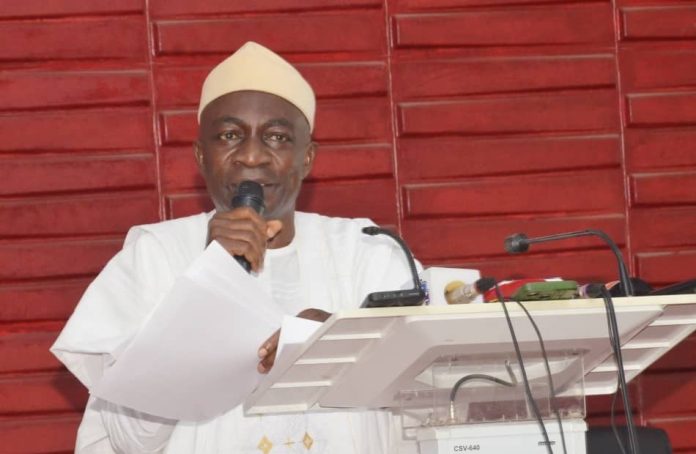News Investigators/ The Senate says the security challenges, such as banditry, terrorism and kidnapping hitherto plaguing the country is now on the downward trend.
Spokesperson for the senate, Yemi Adaramodu, made the statement in an interview with the News Agency of Nigeria (NAN) on Sunday in Abuja.
Mr Adaramodu, who is the Senate Committee Chairman on Media and Public Affairs, said that the military had done well in the fight against insecurity in the country.
“The reason the military has done well is because the National Assembly ensures that appropriation is adequately done to ensure they get what they needed for arms and ammunition and welfare of the soldiers.
“On daily basis, we now hear and see practically how the military has been neutralising these bandits and terrorists. So we can say that banditry is localised in one or two states now and they are being tackled,” he said.
According to the senate spokesperson, the spate of kidnappings witnessed several months back in some parts of the country has grossly reduced.
“All over the world, we know that there is insecurity. For instance, in America, you will be in a shop and somebody will come and open fire without any reason.
“So we will always be having criminals in the society, but it is not the same spate that we were having it before that is the situation today,’’ he said.
Mr Adaramodu, representing Ekiti South Senatorial District, who warned against playing politics with security, noted that before now, it used to be one day one trouble in the country.
“Before now, Nigerians were unable to sleep, but now, the situation has changed but because of politics, they (critics) can go to town and be brandishing all those rhetorics.
“Anybody who choses to be reasonable can attest to the fact that the issue of kidnapping has gone down.
“For me, I think this development calls for kudos to the military, the president and the national assembly,’’ he said.
In term of the economy, the senator noted that for the first time in several years, Nigeria was recording trade surplus.
“What that means is that Nigeria now exports more goods and services than it imports, resulting in balance of trade.
“You don’t need to be a renowned economist like Prof. Christopher Okigbo or Prof. Sam Aluko to understand trade surplus, and this indicates that our economy is picking up,” he said.
Mr Adaramodu also stated that the naira/dollar exchange rate was becoming stable.
“Initially, what Nigeria was spending in subsidising the dollar was even more than the petroleum subsidy. The subsidy was about N7 trillion, while subsidy on petroleum hovered around N4 trillion. Now that all these have stopped, it shows that our economy is picking up,’’ he said.
Mr Adaramodu recalled that in the past, the Nigerian National Petroleum Corporation Limited (NNPCL) was not remitting any revenue to the Federation Account, as they claimed that no crude oil was going out of the country.
“All that the country relied on were taxes, dues and other duties, but today, Nigeria is exporting up to 1.8 million barrels of crude oil per day and when we add the condensate, it is up to two million barrels per day.
“For the first time, we are also hearing that debts have been liquidated.
“This is the first time the International Monetary Fund (IMF) is coming up to say that the money we borrowed (about N4 trillion) had been paid.
“This is the first time since we have been servicing debts with our in-takes with about 97 per cent that it has reduced further to 63 per cent.
“This is also the first time we are talking about Gross Domestic Product (GDP) growth of about 4.3 per cent. We had always been in the minus and definitely, we can’t say that the economy is in a parlous state,’’ he said.
The lawmaker, while acknowledging that the economic indexes had yet to translate into much improved living standards for the average Nigerian, called for more patience and understanding.
“If somebody is sick and he/she goes to the hospital, and after diagnosis, they start to apply the correct medication and treatments, it is not immediately that you start getting well and that also applies to the economy.
“Before now, Nigeria’s economy was in the intensive care unit (ICU), but Tinubu’s government came to put oxygen and thereafter, apply the drugs.
“Now, the economy is to be discharged from the hospital and it is only when this happens that we can begin to say that we are reaping the gains,” he said.
Adaramodu stated that though two years had gone in the first tenure of Tinubu’s administration, it won’t take too much time for things to get better in the country.
“Since we are now beginning to pay back our loans, having trade surplus, we are no more servicing debts with almost 100 per cent of what we earn, since we are now exporting almost two million barrels of crude oil per day, things will get better very soon,’’ he assured.
He said though Nigeria was still borrowing, just like any other country, what was important is that the monies were being tied to specific projects.
“There is no time the money a country is making will be enough to meet its needs in all the sectors. When you borrow, it depends at what rate and the specific projects such monies are expended on.
“Nigeria, under Tinubu’s government no longer borrows to service debts, and whenever request for foreign loan comes, the senate always interrogates it to ensure that it is attached to what the loan is meant for.
“For instance, you are doing coastal roads or you want to do humanitarian projects, apply it, and once that is done, we are not bothered,” he said.
Adaramodu said that the 10th senate would not give approval to any loan request with no specific reasons attached to it.
NAN


